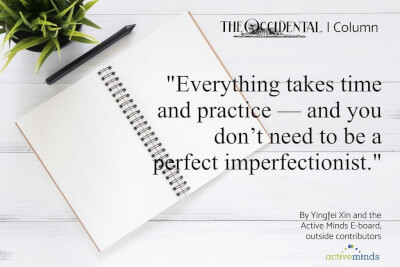Finals week is a good time to talk about perfectionism and procrastination. I imagine many of us are going to be up until 2 a.m., trying to get six assignments done — and get them done perfectly. I have seen books, articles and therapy groups addressing perfectionism as a problem, and this is a little confusing to me because I think we all exhibit qualities of perfectionism to some degree.
The difference lies in the type of perfectionism: adaptive or maladaptive. Maladaptive perfectionism is characterized by setting unattainable goals for yourself. It’s healthy to push yourself a little bit to meet a goal, but when you only focus on how much you fall short of achieving that goal and get excessively frustrated by the gap, perfectionism becomes harmful and maladaptive.
Perfectionism grows out of a deep sense of insecurity — the fear that if you don’t meet a certain goal, you will be useless and no one will love you. Some people acquire such insecurity from specific encounters: I once bought a non-refundable flight ticket at the wrong time for my family, and they were, of course, not happy, so later I got into the habit of triple-checking everything before submitting it. Sometimes perfectionism develops as a tool to gain respect — or more generally, acceptance — like acing an exam to be admired by your peers as well as to get a good grade in the class. This is not necessarily a bad thing, because acceptance is a key pillar to satisfying our basic psychological needs. Yet the desire for acceptance should never be the sole driving force to succeed, or it could become counterproductive. Imagine what it would be like to base all our value on what other people think of us — something we have zero control over.
The following mantras have successfully helped me combat my maladaptive perfectionism: believe that you are who you think you are, and be optimistic. Your value is not contingent on other people’s approval. You are not defined by the grade you get on your chemistry test or the criticism you get from your supervisor. Just because you make a mistake does not mean that you are a terrible person — it means that you have room for growth. It means that you made an attempt to improve, you added variation to your daily routine and you ventured into a new territory. These are things we can have fun doing, and they are worth celebrating.
In his book “Mini Habits,” author Stephen Guise writes that perfectionism actually causes procrastination: we don’t start because we think we are going to fail. Have you ever not wanted to start a paper because you thought you would get stuck at writing a good intro, not have the best choice of words or lose the evidence-analysis balance? But who says that we need to get everything right the first time? Start by doing just a little bit. Put your thoughts down on the paper, even if they are incoherent. At least it gets you started and gives you an idea of what your final work could look like. Once you start, the overwhelming task can be broken down into smaller, more manageable pieces.
Perfectionism is healthy insofar as it motivates you to strive to do better. When studying for your finals, take intentional pauses for mini mental health check-ins: Is my academic diligence jeopardizing my social life and physical health? Do I spend more time getting frustrated than feeling motivated and hopeful? If yes, find a more positive way to deliver good work.
It’s not a problem if you don’t find the best coping mechanisms right away. Everything takes time and practice — and you don’t need to be a perfect imperfectionist.
Authors for this piece are Yingfei Xin and the Active Minds E-board, a chapter of the organization at Occidental College. Active Minds is a national organization that aims to reduce the stigma surrounding mental illness and promote good mental health.
![]()































